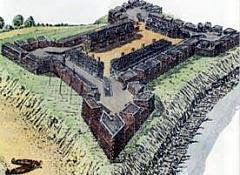 |
| Fort William, named after King William III,Calcutta.www.infoindiatravel.com |
Fort William is one of the most impressive structures among the European fortifications in Asia with a garrison of 15,000 men to defend it. Based on the model of Vauban’s 17th century defensive concepts, the work was entrusted to Archibald Campbell, who replaced Captain John Brohier as the latter was charged with some inexcusable malpractices. Archibald Campbell, unlike his predecessors, was friendly with the native workers and never had any racial bias. He also used some innovative methods to use the locally available construction materials to maintain the European standard. It took nearly 13 years to complete the project first initiated by Clive. With the completion of a formidable fort, the British could function with complete authority with out any fear of invasions from enemies within the confines of Ft. Williams.
 |
| Fort William,Calcutta.work began in 1758.puronokolkata.com |
There are two Fort Williams built by the British.The earlier one was built in 1696 and newer one in 1781. Fort William was a primary trading station for the East India company, their first foray in the maritime mercantile operations in the Indian subcontinent, the rest is history. The land was leased to the company by the Nawob of Bengal. Calcutta was purchased by the English in 1698 and declared a Presidency Town of the East India Company in 1699.
The old fort was built near the east bank of the River Hooghly and named after King William III of England, other additions included bastions and a government house - factory at the center (1700 to 1702). Built under the supervision of John Goldsborough, it was a two-storied building with projecting wings built for security and company's trading operations. It was in the guardroom in this fort the world famous 'black hole' tragedy took place on 20 June, 1756. Siraj Ud Daulah, the Nawob of Bengal attacked the fort for continuous non payment of trade duty taxes due to the Nawob and frequent wanton violation of trade agreement by the English company. The fort was heavily damaged by the Nawob's army and the British got thrashed in the massive attack in 1756. The Nawob took control of Ft. William and changed the name to Alinagar. Soon the fort was recaptured by the British and, consequently there arose a necessity for them to have a new fort built with better defense facilities and firing lines.
The new and strong fort with enough space around it was built in 1781 at the initiative of Robert Clive who started the work in 1758 soon after his victory in the battle of Plassey. The Nawob Siraj Ud Daulah was caught in a trap hatched by Clive and and his conspirators and was murdered by his own relative. The total construction cost of the fort was roughly two million pounds. The fort covers 70.9 heaters of land. with a vast Maidan - open space around 3 km in the N-S direction and roughly 1 km wide.
 |
| New Ft. William campus at Gobindapur,Calcutta. Designed by John Brohier, puronokolkata.com |
 | ||
| The Garrison Church, Ft.William, Calcutta,rom the Illustrated London News, 1866."www.columbia.edu |
 |
| Original, or the first of the two Fort Williams built in 1696 puronokolkata.com |
 |
| Fort William, a view from the inside, c.1828. en.wikipedia.org |
military purpose. The fort, made of brick and mortar in irregular octagonal shape with three sides facing the near-by Hoogley river, was a self-contained
fort with enough room for storage of arms and ammunition, lodging facilities for soldiers, including a functional Church - the Neo-Gothic church of St. Peter; church work started in 1822 and consecrated in 1828. It used to serve as a chaplaincy center for the British. The fort is surrounded by a dry moat 9 meter deep and fifteen meter broad and can be flooded. If the enemies try to cross the moat the enfiladed positions are really deadly bear-pits from which they can not escape. Among the six gates, the gate facing Chowringhee was exclusively meant for the elite, and hence known as the Royal Gate. Above each of the gates was a residence for commanding officers.
Presently Indian military's Eastern Command 's office is functioning in Ft.William. There is a library in the place which was once St.Peter's church.
https://en.wikipedia.org/wiki/Fort_William,_India









